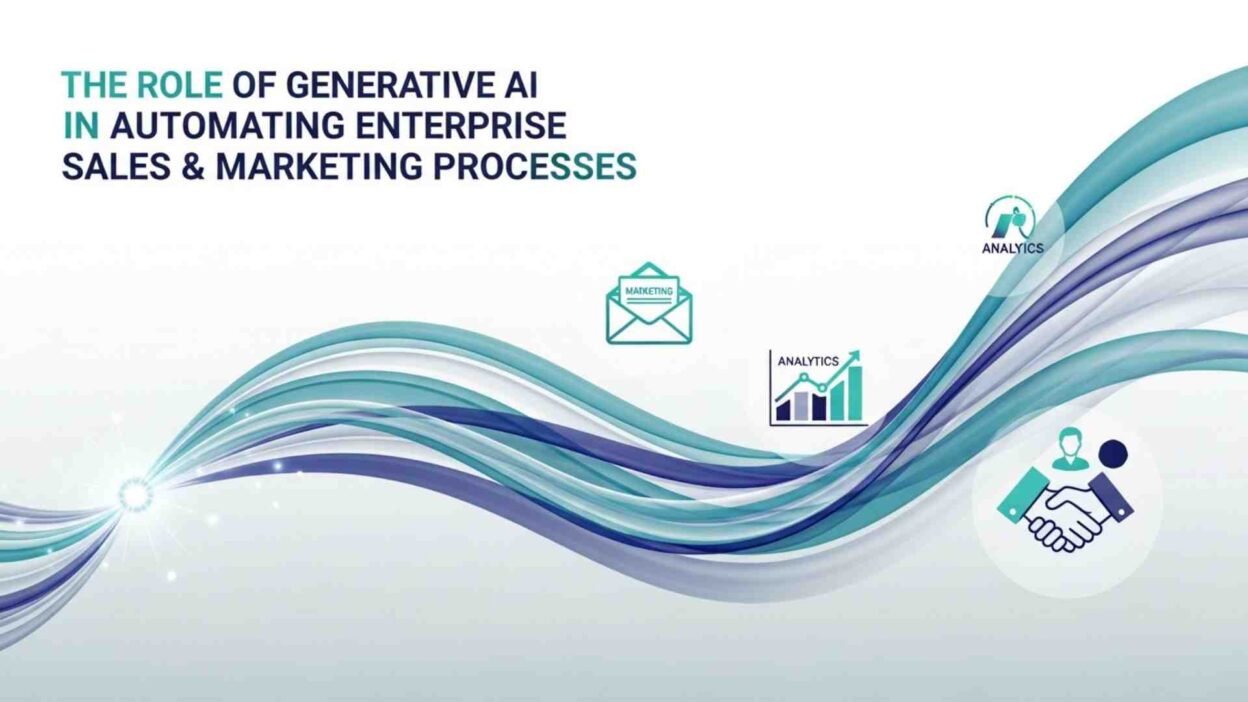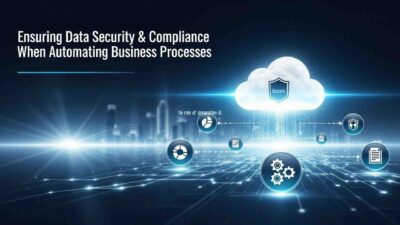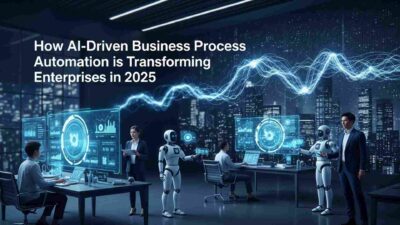Introduction
TL;DREnterprise sales and marketing teams face mounting pressure to deliver results faster. Traditional methods struggle to keep pace with modern buyer expectations and market dynamics. Generative AI has emerged as a transformative force reshaping how businesses approach customer engagement. This technology automates repetitive tasks while enhancing creative output and strategic decision-making. AI marketing workflow automation now enables organizations to scale personalization and improve conversion rates dramatically.
Table of Contents
Understanding Generative AI in Enterprise Contexts
Generative AI creates original content rather than simply processing existing information. The technology learns from massive datasets to produce text, images, videos, and other media formats. Enterprise applications extend far beyond simple content generation into complex business processes. Organizations leverage these capabilities to transform their sales and marketing operations fundamentally.
What Makes Generative AI Different from Traditional Automation
Traditional automation follows rigid rules and predefined workflows without deviation or adaptation. Generative AI understands context and creates unique outputs tailored to specific situations. The technology adapts its responses based on user inputs and behavioral patterns observed. Machine learning enables continuous improvement as the system processes more data over time. Creative capabilities allow generative AI to produce content that feels human-crafted and authentic.
Standard automation handles repetitive tasks but cannot generate novel solutions or content. AI marketing workflow automation goes deeper by understanding customer intent and preferences dynamically. The system analyzes sentiment, tone, and context to deliver appropriate responses automatically. Predictive capabilities help anticipate customer needs before explicit requests occur naturally.
Core Capabilities Transforming Sales and Marketing
Natural language processing enables AI to understand and generate human-like communications effectively. Computer vision allows analysis of visual content for marketing campaigns and brand monitoring. Predictive analytics forecast customer behavior and campaign performance with remarkable accuracy consistently. Personalization engines create customized experiences for individual prospects and customers at scale. Content generation produces marketing copy, sales emails, social media posts, and more rapidly.
Revolutionizing Content Creation and Marketing Campaigns
Content demands continue escalating as audiences consume information across multiple channels constantly. Marketing teams struggle to produce enough high-quality content to maintain engagement levels desired. Generative AI addresses this challenge by dramatically accelerating content production workflows efficiently.
Automated Content Generation at Scale
AI systems create blog posts, articles, and website copy aligned with brand voice. Product descriptions generate automatically from technical specifications and feature lists provided. Social media content adapts to different platform requirements and audience preferences automatically. Email marketing copy personalizes based on recipient data and previous interaction history. Video scripts and storyboards emerge from brief creative briefs and campaign objectives.
AI marketing workflow automation ensures consistent quality across all generated content pieces. The technology maintains brand guidelines and tone throughout every communication touchpoint reliably. Multi-language content generation enables global campaigns without extensive translation resources required. A/B testing variations emerge automatically to optimize messaging performance continuously over time.
Dynamic Campaign Optimization
Real-time performance monitoring adjusts campaign elements based on engagement data streaming in. AI systems modify ad copy, imagery, and targeting parameters to improve results automatically. Budget allocation shifts toward high-performing channels and audience segments dynamically during campaigns. Predictive models forecast campaign outcomes before full deployment occurs in market. Automated recommendations suggest improvements based on historical performance patterns and current trends.
Campaign testing occurs simultaneously across multiple variables to identify winning combinations faster. AI marketing workflow automation eliminates manual optimization tasks that consume significant team time. Performance dashboards highlight key insights without requiring data analysis expertise from users. Anomaly detection flags unusual patterns that might indicate problems or opportunities emerging.
Personalization at Individual Customer Level
Generative AI creates unique content variations for different audience segments automatically and efficiently. Dynamic website content adapts based on visitor behavior and demographic information available. Email personalization extends beyond name insertion to customized offers and messaging throughout. Product recommendations align with individual preferences and purchase history patterns observed previously. Landing pages modify content and calls-to-action based on traffic source and user intent.
Behavioral triggers activate personalized content delivery at optimal moments in the customer journey. Micro-segmentation enables targeting based on hundreds of data points simultaneously for precision. Real-time personalization adjusts content as users interact with websites and digital properties actively. Cross-channel consistency maintains personalized experiences across email, web, social, and mobile touchpoints.
Transforming Lead Generation and Qualification
Lead generation consumes substantial resources yet often produces inconsistent results for sales teams. Qualification processes require significant time investment before identifying truly viable opportunities worth pursuing. Generative AI streamlines these activities while improving lead quality and conversion rates measurably.
Intelligent Lead Scoring and Prioritization
AI models analyze hundreds of data points to score lead quality accurately and objectively. Behavioral signals combine with demographic and firmographic data for comprehensive lead assessment. Predictive scoring identifies which leads most likely convert based on historical patterns observed. Dynamic scoring updates continuously as prospects interact with marketing touchpoints and content pieces. Priority rankings help sales teams focus efforts on highest-value opportunities first always.
AI marketing workflow automation eliminates subjective bias from lead qualification decisions made daily. Machine learning improves scoring accuracy as the system processes more successful and unsuccessful conversions. Integration with CRM systems ensures sales teams access current lead scores and insights. Automated alerts notify reps when high-value leads take significant actions warranting immediate follow-up.
Automated Lead Nurturing Campaigns
Drip campaigns adapt content and timing based on individual prospect engagement patterns automatically. AI determines optimal send times for maximum open and click-through rates per recipient. Content recommendations select the most relevant resources for each prospect’s current journey stage. Multi-channel nurturing coordinates touchpoints across email, social media, and advertising platforms seamlessly. Engagement scoring identifies when prospects reach sales-ready status requiring human intervention now.
Conversational AI chatbots engage website visitors and qualify leads through natural dialogue instantly. The technology answers questions and provides information without requiring sales team availability constantly. Lead capture forms optimize field selection based on conversion data and user behavior analysis. Follow-up sequences trigger automatically based on form submissions and content download activities observed.
Conversational AI for Initial Engagement
Chatbots handle initial prospect conversations on websites and social media platforms 24/7 continuously. Natural language understanding enables human-like interactions that feel personal and helpful throughout exchanges. Qualification questions emerge naturally within conversations rather than feeling like interrogations to prospects. Appointment scheduling occurs automatically when prospects express interest in speaking with sales representatives. CRM integration captures conversation data and insights for sales team reference and follow-up preparation.
AI marketing workflow automation through chatbots reduces response times from hours to seconds. The technology handles multiple conversations simultaneously without quality degradation or delays occurring. Sentiment analysis detects frustration or urgency requiring immediate human escalation and intervention appropriately. Multilingual capabilities enable global lead engagement without language barriers limiting reach unnecessarily.
Enhancing Sales Enablement and Productivity
Sales professionals spend too much time on administrative tasks instead of selling activities. Information scattered across systems makes finding relevant content and insights challenging during deals. Generative AI consolidates resources and automates routine work to maximize selling time available.
Automated Sales Content Creation
Email templates generate automatically based on prospect data and deal stage information. Proposal documents compile relevant case studies, pricing, and specifications without manual assembly required. Presentation decks customize automatically for specific industries and use cases being discussed. Follow-up messages craft personalized recaps after meetings highlighting key discussion points covered. Contract drafting accelerates through AI-generated templates aligned with specific deal parameters agreed.
Sales collateral updates automatically when product features or competitive information changes in systems. AI marketing workflow automation ensures reps always access current and accurate materials needed. Version control eliminates confusion about which documents represent the latest approved content available. Content recommendations surface the most effective materials based on deal characteristics and historical success.
Intelligent Sales Assistance
AI assistants provide real-time guidance during customer calls and meetings through prompts displayed. Competitive intelligence surfaces automatically when prospects mention competitor names or products specifically. Objection handling suggestions appear based on concerns raised during conversations with prospects naturally. Next-best-action recommendations guide reps on optimal follow-up steps after each interaction occurs. Deal risk alerts identify warning signs that opportunities might stall or lose momentum.
CRM data entry automation captures meeting notes and action items without manual input required. Email analysis extracts key information and updates opportunity records automatically after communications occur. Calendar management suggests optimal meeting times based on deal urgency and stakeholder availability shown.
Predictive Deal Insights
AI analyzes opportunity data to forecast deal closure probability with remarkable accuracy levels. Pipeline health assessments identify deals requiring immediate attention or likely to slip from forecasts. Win-loss pattern recognition reveals factors contributing to successful and unsuccessful outcomes historically. Discount optimization recommends pricing strategies maximizing both win rates and deal values achieved. Timeline predictions estimate realistic close dates based on deal characteristics and historical velocity.
AI marketing workflow automation provides sales leaders with accurate forecasting for revenue planning purposes. The technology identifies coaching opportunities by highlighting skill gaps or process deviations observed. Territory performance comparisons reveal best practices worth replicating across the entire team broadly.
Optimizing Customer Relationship Management
Customer relationships require ongoing nurturing and attention to maximize lifetime value achieved. Manual tracking and outreach prove impossible as customer bases grow beyond manageable sizes. Generative AI automates relationship management while maintaining personalization and authenticity in communications.
Automated Customer Communication
Check-in emails generate automatically at appropriate intervals based on customer engagement patterns detected. Birthday and anniversary messages personalize with relevant offers or appreciation notes crafted specially. Renewal reminders trigger with compelling reasons to continue the business relationship established previously. Upsell recommendations identify opportunities to expand accounts based on usage patterns and needs analysis. Support follow-ups ensure customer satisfaction after service interactions or issue resolution occurs.
Communication preferences adapt based on customer response patterns and stated preferences recorded previously. Sentiment analysis monitors customer communications for signs of dissatisfaction requiring immediate attention now. Multi-channel coordination ensures consistent messaging across email, phone, and in-person touchpoints maintained.
Proactive Churn Prevention
Early warning systems identify customers at risk of churning based on engagement decline observed. Automated intervention campaigns activate to re-engage at-risk customers before they leave entirely. Personalized retention offers generate based on customer value and specific concerns identified through analysis. Win-back campaigns target churned customers with compelling reasons to return and reconsider decisions. Usage monitoring alerts customer success teams when adoption levels fall below healthy thresholds.
AI marketing workflow automation reduces churn rates by enabling timely interventions before situations escalate. Predictive models calculate churn probability for individual accounts allowing prioritized attention allocation wisely. Root cause analysis identifies common factors contributing to customer attrition patterns observed.
Expansion and Upsell Automation
Product recommendation engines identify expansion opportunities based on current usage and similar customer patterns. Cross-sell campaigns automatically promote complementary products to existing customers at optimal times. Usage-based triggers activate upsell conversations when customers approach plan limits or capacity constraints. Success milestones trigger automated campaigns celebrating achievements and suggesting next-level solutions available. Account growth scoring prioritizes customers with highest expansion potential for focused attention.
Streamlining Marketing Operations and Analytics
Marketing operations involve countless interconnected tasks and complex data analysis requirements daily. Teams drown in metrics while struggling to extract actionable insights from overwhelming information volumes. AI simplifies operations and surfaces meaningful intelligence that drives better decision-making consistently.
Automated Campaign Management
Campaign setup processes accelerate through AI-powered templates and workflow suggestions provided automatically. Asset creation coordinates across teams with automated task assignments and deadline tracking implemented. Approval workflows route materials to appropriate stakeholders based on campaign type and content. Launch checklists ensure no critical steps get missed before campaigns go live in market. Post-campaign wrap-ups compile performance data and learnings for future reference and improvement.
AI marketing workflow automation reduces campaign launch times from weeks to days or hours. Resource allocation optimizes based on campaign priorities and team capacity constraints identified. Budget tracking monitors spending in real-time with alerts when campaigns approach or exceed limits.
Advanced Analytics and Reporting
Automated report generation compiles performance metrics across all marketing channels and campaigns regularly. Attribution modeling connects marketing touchpoints to revenue outcomes with multi-touch analysis performed. ROI calculations determine which activities deliver best returns on investment made previously. Trend identification highlights emerging patterns in customer behavior and market dynamics developing. Visualization tools create compelling dashboards communicating insights to stakeholders clearly without manual creation.
Predictive analytics forecast future campaign performance based on current trends and historical data available. Anomaly detection flags unusual patterns requiring investigation or indicating new opportunities emerging. Competitive benchmarking compares performance against industry standards and direct competitors automatically when possible.
Process Optimization Recommendations
AI identifies bottlenecks in marketing workflows that slow down campaign execution and delivery. Efficiency recommendations suggest automation opportunities for repetitive tasks consuming significant time currently. Resource reallocation advice helps optimize team focus on highest-impact activities rather than busywork. Technology stack analysis identifies underutilized tools or gaps requiring new solutions for better performance. Best practice insights emerge from analysis of high-performing campaigns and marketing activities conducted.
Addressing Implementation Challenges
Adopting generative AI requires careful planning and change management to succeed effectively. Organizations face technical, cultural, and strategic hurdles during implementation processes undertaken. Understanding these challenges helps develop strategies to overcome them and realize full benefits possible.
Data Quality and Integration Requirements
AI systems require substantial high-quality data to function effectively and deliver accurate results. Data silos prevent AI from accessing the complete information needed for optimal performance. Inconsistent data formats and definitions cause integration challenges across disparate systems used. Historical data cleaning proves necessary before AI can leverage information for training purposes. Ongoing data governance ensures information quality remains high as new data accumulates continuously.
AI marketing workflow automation depends on seamless integration with existing marketing technology stacks. API connections link AI tools with CRM, marketing automation, and analytics platforms currently deployed. Real-time data synchronization keeps all systems updated with latest customer information available always. Master data management establishes single sources of truth for critical business information used.
Change Management and Team Adoption
Sales and marketing teams may resist AI adoption fearing job displacement or loss of autonomy. Training programs help teams understand AI as an enhancement rather than replacement of human capabilities. Use case demonstrations showcase tangible benefits and quick wins achievable through AI implementation. Champions within teams advocate for adoption and help colleagues navigate new workflows introduced. Feedback mechanisms allow teams to report issues and suggest improvements to AI implementations.
Cultural shifts toward data-driven decision-making support AI adoption and utilization across organizations broadly. Performance metrics evolve to reflect AI-augmented workflows and new capabilities available to teams. Incentive structures reward effective AI utilization and outcomes achieved through technology leverage.
Maintaining Brand Voice and Authenticity
AI-generated content requires oversight to ensure alignment with brand guidelines and quality standards. Human review processes catch errors or inappropriate outputs before customer-facing deployment occurs. Brand training teaches AI systems specific voice, tone, and style requirements for consistency. Template libraries provide approved frameworks guiding AI content generation within acceptable boundaries. Version control tracks content iterations and approvals maintaining audit trails for governance purposes.
AI marketing workflow automation balances efficiency gains with quality control requirements for brand protection. Testing protocols validate AI outputs meet quality thresholds before broader deployment across channels. Customer feedback loops identify instances where AI-generated content misses the mark for improvements.
Ethical Considerations and Transparency
Disclosure policies inform customers when they interact with AI rather than human representatives. Bias monitoring ensures AI systems treat all customers fairly without discriminatory patterns emerging. Privacy protections safeguard customer data used to train and operate AI systems deployed. Consent management respects customer preferences regarding AI-driven personalization and automation applied. Regulatory compliance addresses emerging laws governing AI use in marketing and sales activities.
Measuring Success and ROI
Organizations must quantify the impact of AI investments to justify continued funding and expansion. Meaningful metrics demonstrate value creation beyond simple efficiency gains achieved through automation alone.
Key Performance Indicators
Content production velocity measures how quickly teams create and deploy marketing materials needed. Lead quality improvements show through higher conversion rates and shorter sales cycles observed. Sales productivity gains appear in more deals closed per representative compared to historical averages. Customer engagement metrics track response rates, time spent, and interaction quality across touchpoints. Revenue attribution connects AI-driven activities to actual sales outcomes and pipeline contribution achieved.
Cost savings calculations compare AI-automated processes against previous manual effort required for tasks. Time-to-market improvements demonstrate faster campaign launches and competitive responsiveness enhanced through AI. Personalization effectiveness measures through engagement lift from customized versus generic communications delivered.
Calculating Return on Investment
Implementation costs include technology licensing, integration services, and training investments made initially. Operational savings emerge from reduced headcount needs or redeployment to higher-value activities. Revenue increases attribute to improved conversion rates and higher deal values closed successfully. Efficiency gains translate to more campaigns executed and more prospects engaged with same resources. Customer lifetime value improvements result from better retention and expansion enabled by AI.
AI marketing workflow automation typically delivers positive ROI within twelve to eighteen months of implementation. Quick wins in specific use cases build momentum and justify expansion to additional applications. Continuous improvement compounds benefits over time as AI systems learn and optimize continuously.
Long-Term Value Creation
Competitive advantages emerge from superior customer experiences and faster market responsiveness enabled permanently. Scalability allows growth without proportional increases in sales and marketing headcount required. Innovation capacity increases as teams focus on strategy rather than execution mechanics and details. Market insights deepen through AI analysis revealing patterns humans might miss in data volumes. Organizational learning accelerates as AI captures and codifies best practices across teams broadly.
Future Trends in AI-Powered Sales and Marketing
Generative AI continues evolving rapidly with new capabilities emerging regularly across vendors and platforms. Forward-thinking organizations prepare for coming innovations to maintain competitive advantages in markets served.
Multimodal AI Capabilities
Next-generation systems process and generate text, images, audio, and video simultaneously for richer experiences. Virtual sales assistants with video avatars conduct product demonstrations and initial prospect meetings. Interactive content adapts in real-time based on user reactions and engagement signals detected. Immersive experiences blend augmented reality with AI-generated content for memorable brand interactions created.
AI marketing workflow automation will extend beyond digital channels into physical retail and event experiences. Voice-enabled interactions allow hands-free engagement with AI assistants throughout customer journeys naturally. Cross-modal understanding enables AI to analyze images, interpret speech, and generate appropriate multimedia responses.
Autonomous Marketing Agents
Self-optimizing campaigns run with minimal human oversight while achieving performance targets consistently and reliably. End-to-end workflow automation manages entire processes from planning through execution and analysis completion. Strategic decision support provides recommendations on budget allocation, channel mix, and targeting approaches optimal. Collaborative AI works alongside humans rather than simply executing predefined tasks assigned by people. Learning systems improve continuously without requiring explicit programming or rule updates from teams.
Hyper-Personalization at Scale
Individual-level optimization creates unique experiences for every customer rather than broad segment targeting. Real-time adaptation modifies content and offers instantly based on immediate context and signals. Predictive personalization anticipates needs and delivers relevant content before explicit requests occur naturally. Emotional intelligence enables AI to detect and respond appropriately to customer sentiment and mood. Cross-channel orchestration maintains consistent personalized experiences across all touchpoints seamlessly throughout journeys.
AI marketing workflow automation will enable personalization depth previously possible only for VIP customers extended broadly. Privacy-preserving techniques allow personalization without compromising customer data protection requirements or expectations. Contextual awareness considers location, weather, time, and other situational factors in personalization delivered.
Frequently Asked Questions
What exactly is AI marketing workflow automation?
AI marketing workflow automation uses artificial intelligence to streamline and optimize marketing processes automatically. The technology handles repetitive tasks like content creation, lead scoring, and campaign management without constant human intervention. Machine learning enables these systems to improve performance over time through experience and data analysis. Generative AI adds creative capabilities that produce original content rather than just processing existing information. Organizations deploy these tools to increase efficiency while enhancing the quality and personalization of marketing efforts.
How does generative AI differ from traditional marketing automation tools?
Traditional marketing automation follows predefined rules and workflows without adaptation or learning occurring naturally. Generative AI creates original content and makes intelligent decisions based on context and patterns. The technology understands natural language and generates human-like communications tailored to specific situations. Predictive capabilities forecast outcomes and recommend actions rather than simply executing programmed sequences. Creative functions produce marketing materials that would otherwise require human content creators and designers.
What marketing tasks can AI automate effectively?
Content creation for blogs, social media, emails, and advertising copy happens automatically through AI. Lead scoring and qualification processes analyze prospect data to identify sales-ready opportunities worth pursuing. Campaign optimization adjusts messaging, targeting, and budgets to improve performance in real-time during execution. Customer segmentation groups audiences based on hundreds of behavioral and demographic variables simultaneously analyzed. Reporting and analytics compile performance data and extract actionable insights without manual analysis required.
How does AI marketing workflow automation improve lead quality?
Predictive scoring models analyze historical conversion data to identify characteristics of high-quality leads accurately. Behavioral analysis tracks prospect engagement patterns that indicate genuine interest and purchase intent clearly. Automated qualification questions gather critical information without overwhelming prospects with lengthy forms immediately. Real-time enrichment appends additional data to lead records for more complete assessment capabilities. Dynamic scoring updates continuously as prospects interact with content and marketing touchpoints over time.
What ROI can companies expect from AI marketing automation?
Most organizations see positive ROI within twelve to eighteen months of implementing AI marketing tools. Content production costs decrease by 40-60% through automation while output volumes increase substantially simultaneously. Lead conversion rates improve 20-30% through better scoring and personalization enabled by AI capabilities. Sales productivity gains of 30-50% emerge as automation handles routine tasks freeing rep time. Customer retention rates increase 15-25% through proactive engagement and churn prevention enabled automatically.
How do you maintain brand voice when using AI-generated content?
Brand training processes teach AI systems specific voice, tone, and style requirements for consistency. Template libraries provide approved frameworks that guide content generation within acceptable brand boundaries. Human review validates AI outputs before publication ensuring quality and brand alignment maintained. Feedback loops allow teams to flag issues and refine AI performance over time continuously. Custom models trained on existing brand content produce outputs naturally aligned with established voice.
What data does AI marketing workflow automation require?
Customer demographic and firmographic information provides foundational targeting and personalization data needed initially. Behavioral data tracking website visits, email engagement, and content consumption reveals intent and interests. Purchase history and transaction data enable product recommendations and predictive modeling of future behavior. Campaign performance metrics train AI systems to optimize future marketing activities for better results. Third-party data enrichment supplements internal information with additional insights about prospects and customers.
How long does AI marketing automation implementation take?
Basic implementations with pre-built integrations launch in 4-8 weeks for standard use cases typically. Custom implementations requiring integration work and model training extend to 3-6 months usually. Phased rollouts spread implementation across quarters starting with highest-impact use cases first strategically. Pilot programs test AI capabilities in limited scenarios before broader organizational deployment occurs. Continuous optimization extends beyond initial launch as teams refine workflows and AI performance improves.
What skills do marketing teams need to work with AI tools?
Data literacy helps marketers interpret AI insights and recommendations provided by automated systems effectively. Prompt engineering skills enable teams to guide generative AI toward desired outputs and results. Critical thinking remains essential for evaluating AI recommendations and catching potential errors before deployment. Strategic planning capabilities ensure AI deployment aligns with broader business objectives and customer needs. Change management skills facilitate team adoption and integration of AI into existing workflows successfully.
How does AI marketing workflow automation handle privacy regulations?
Consent management systems ensure marketing activities comply with GDPR, CCPA, and other privacy laws. Data minimization principles limit AI to processing only information necessary for specific purposes. Automated data retention policies delete information when no longer needed for legitimate business purposes. Privacy-by-design approaches build compliance into AI systems from initial development rather than bolting on later. Regular audits verify AI activities remain compliant as regulations evolve over time continuously.
Read More:-Modern Development Stack: From Frontend to AI Integration in 2025
Conclusion

Generative AI fundamentally transforms how enterprises approach sales and marketing activities today. The technology delivers efficiency gains that free teams to focus on strategic and creative work. AI marketing workflow automation enables personalization at scales previously impossible for organizations of any size.
Early adopters gain significant competitive advantages in their markets through AI implementation success. Customer experiences improve dramatically when AI delivers relevant content at optimal moments consistently. Revenue growth accelerates as sales and marketing processes become more efficient and effective simultaneously.
Implementation requires thoughtful planning and change management to succeed long-term in organizations broadly. Data quality and integration work lay foundations for AI systems to perform optimally. Teams need training and support to embrace AI as an augmentation of their capabilities.
The ROI from AI marketing automation justifies investments through measurable improvements in key metrics. Cost reductions combine with revenue increases to deliver substantial value to bottom lines. Productivity gains allow organizations to accomplish more with existing resources and budgets available.
Future developments will expand AI capabilities into new marketing and sales domains continuously. Organizations that build AI competencies now will lead their industries in coming years. The question is no longer whether to adopt AI marketing workflow automation but how quickly to implement it.
Your competitive position depends on embracing these technologies strategically and effectively today. Start with high-impact use cases that deliver quick wins and build organizational confidence. Scale successful implementations across additional processes and teams to maximize value creation achieved. The transformation journey requires commitment but rewards organizations with sustainable competitive advantages in markets served.





